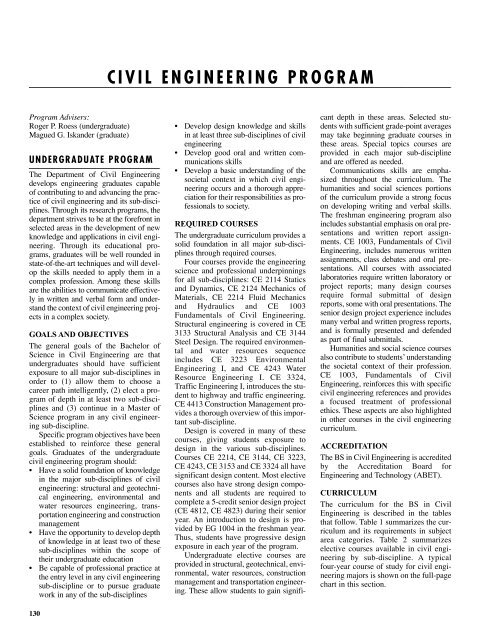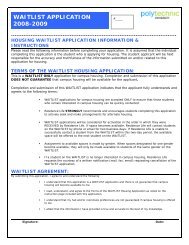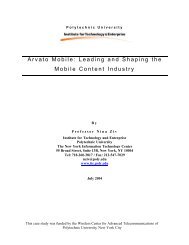POLYTECHNIC UNIVERSITY 2005-2007
POLYTECHNIC UNIVERSITY 2005-2007
POLYTECHNIC UNIVERSITY 2005-2007
You also want an ePaper? Increase the reach of your titles
YUMPU automatically turns print PDFs into web optimized ePapers that Google loves.
CIVIL ENGINEERING PROGRAM<br />
Program Advisers:<br />
Roger P. Roess (undergraduate)<br />
Magued G. Iskander (graduate)<br />
UNDERGRADUATE PROGRAM<br />
The Department of Civil Engineering<br />
develops engineering graduates capable<br />
of contributing to and advancing the practice<br />
of civil engineering and its sub-disciplines.<br />
Through its research programs, the<br />
department strives to be at the forefront in<br />
selected areas in the development of new<br />
knowledge and applications in civil engineering.<br />
Through its educational programs,<br />
graduates will be well rounded in<br />
state-of-the-art techniques and will develop<br />
the skills needed to apply them in a<br />
complex profession. Among these skills<br />
are the abilities to communicate effectively<br />
in written and verbal form and understand<br />
the context of civil engineering projects<br />
in a complex society.<br />
GOALS AND OBJECTIVES<br />
The general goals of the Bachelor of<br />
Science in Civil Engineering are that<br />
undergraduates should have sufficient<br />
exposure to all major sub-disciplines in<br />
order to (1) allow them to choose a<br />
career path intelligently, (2) elect a program<br />
of depth in at least two sub-disciplines<br />
and (3) continue in a Master of<br />
Science program in any civil engineering<br />
sub-discipline.<br />
Specific program objectives have been<br />
established to reinforce these general<br />
goals. Graduates of the undergraduate<br />
civil engineering program should:<br />
• Have a solid foundation of knowledge<br />
in the major sub-disciplines of civil<br />
engineering: structural and geotechnical<br />
engineering, environmental and<br />
water resources engineering, transportation<br />
engineering and construction<br />
management<br />
• Have the opportunity to develop depth<br />
of knowledge in at least two of these<br />
sub-disciplines within the scope of<br />
their undergraduate education<br />
• Be capable of professional practice at<br />
the entry level in any civil engineering<br />
sub-discipline or to pursue graduate<br />
work in any of the sub-disciplines<br />
130<br />
• Develop design knowledge and skills<br />
in at least three sub-disciplines of civil<br />
engineering<br />
• Develop good oral and written communications<br />
skills<br />
• Develop a basic understanding of the<br />
societal context in which civil engineering<br />
occurs and a thorough appreciation<br />
for their responsibilities as professionals<br />
to society.<br />
REQUIRED COURSES<br />
The undergraduate curriculum provides a<br />
solid foundation in all major sub-disciplines<br />
through required courses.<br />
Four courses provide the engineering<br />
science and professional underpinnings<br />
for all sub-disciplines: CE 2114 Statics<br />
and Dynamics, CE 2124 Mechanics of<br />
Materials, CE 2214 Fluid Mechanics<br />
and Hydraulics and CE 1003<br />
Fundamentals of Civil Engineering.<br />
Structural engineering is covered in CE<br />
3133 Structural Analysis and CE 3144<br />
Steel Design. The required environmental<br />
and water resources sequence<br />
includes CE 3223 Environmental<br />
Engineering I, and CE 4243 Water<br />
Resource Engineering I. CE 3324,<br />
Traffic Engineering I, introduces the student<br />
to highway and traffic engineering.<br />
CE 4413 Construction Management provides<br />
a thorough overview of this important<br />
sub-discipline.<br />
Design is covered in many of these<br />
courses, giving students exposure to<br />
design in the various sub-disciplines.<br />
Courses CE 2214, CE 3144, CE 3223,<br />
CE 4243, CE 3153 and CE 3324 all have<br />
significant design content. Most elective<br />
courses also have strong design components<br />
and all students are required to<br />
complete a 5-credit senior design project<br />
(CE 4812, CE 4823) during their senior<br />
year. An introduction to design is provided<br />
by EG 1004 in the freshman year.<br />
Thus, students have progressive design<br />
exposure in each year of the program.<br />
Undergraduate elective courses are<br />
provided in structural, geotechnical, environmental,<br />
water resources, construction<br />
management and transportation engineering.<br />
These allow students to gain significant<br />
depth in these areas. Selected students<br />
with sufficient grade-point averages<br />
may take beginning graduate courses in<br />
these areas. Special topics courses are<br />
provided in each major sub-discipline<br />
and are offered as needed.<br />
Communications skills are emphasized<br />
throughout the curriculum. The<br />
humanities and social sciences portions<br />
of the curriculum provide a strong focus<br />
on developing writing and verbal skills.<br />
The freshman engineering program also<br />
includes substantial emphasis on oral presentations<br />
and written report assignments.<br />
CE 1003, Fundamentals of Civil<br />
Engineering, includes numerous written<br />
assignments, class debates and oral presentations.<br />
All courses with associated<br />
laboratories require written laboratory or<br />
project reports; many design courses<br />
require formal submittal of design<br />
reports, some with oral presentations. The<br />
senior design project experience includes<br />
many verbal and written progress reports,<br />
and is formally presented and defended<br />
as part of final submittals.<br />
Humanities and social science courses<br />
also contribute to students’ understanding<br />
the societal context of their profession.<br />
CE 1003, Fundamentals of Civil<br />
Engineering, reinforces this with specific<br />
civil engineering references and provides<br />
a focused treatment of professional<br />
ethics. These aspects are also highlighted<br />
in other courses in the civil engineering<br />
curriculum.<br />
ACCREDITATION<br />
The BS in Civil Engineering is accredited<br />
by the Accreditation Board for<br />
Engineering and Technology (ABET).<br />
CURRICULUM<br />
The curriculum for the BS in Civil<br />
Engineering is described in the tables<br />
that follow. Table 1 summarizes the curriculum<br />
and its requirements in subject<br />
area categories. Table 2 summarizes<br />
elective courses available in civil engineering<br />
by sub-discipline. A typical<br />
four-year course of study for civil engineering<br />
majors is shown on the full-page<br />
chart in this section.




